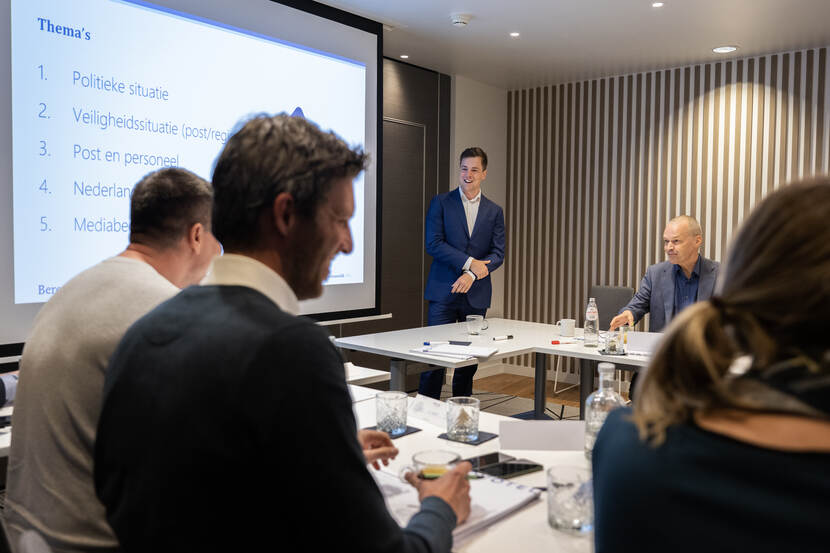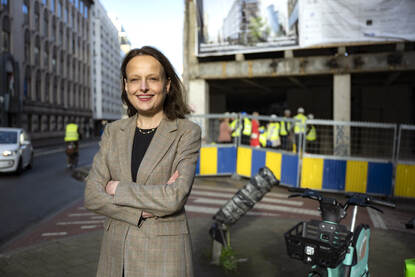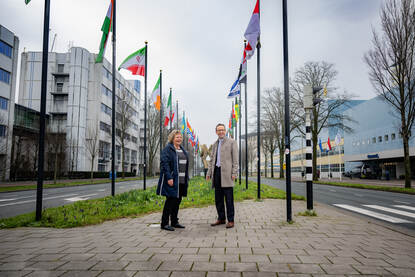What do you need to do to keep your mission as safe as possible? And how should you act in times of crisis? With an ever more challenging foreign policy landscape, more crises and external threats, issues like information security, staff safety, and the need to protect our buildings play a bigger role than ever before. The Ministry of Foreign Affairs Crisis Centre (DCC) trains security coordinators (BVCs) to identify threats and ensure the mission’s security. ‘A mission needs to be able to rely on the BVC during a crisis.’

‘In a period of great uncertainty and isolation, you need to protect your building, and also your staff.’
Protecting your mission during a crisis is no easy task. At every embassy the Deputy Head of Mission is responsible for security at the mission, in their capacity as security coordinator. Together with the ambassador, they assume a leadership role in times of crisis. Martijn Elgersma, Deputy Head of Mission in Moscow, explains how he did this when Russia invaded Ukraine. ‘This crisis didn’t involve a specific threat of violence against Dutch nationals in Russia, or a natural disaster. Rather, it was a period of great uncertainty and isolation. All at once, relations between the West and Russia were even worse than they had already been. European airspace was closed [to flights from Russia]; it was impossible to transfer funds. You needed to protect your building, and also your staff.’

‘We teach BVCs to identify threats and take mitigating measures.’
A safe working environment
In order to ensure that BVCs know how to manage these kinds of crises, every three years they have to take part in a two-day training course, run by the Ministry of Foreign Affairs Crisis Centre (DCC). The DCC was set up a year ago as a new subdivision of the Security, Crisis Coordination and Integrity Department (VCI), and it now has eight permanent staff members. This timing was no coincidence, explains senior policy officer and training coordinator Dick Stroet. ‘The takeover of power by the Taliban in Afghanistan, the invasion of Ukraine and the pandemic showed that we cannot take safety and security for granted, even in Europe. We need to be well prepared.’
DCC plays an overarching role: it seeks to prevent the escalation of unsafe situations, ensure that missions are as thoroughly prepared for a crisis as possible and provide support when a crisis actually does arise. ‘Representing the Netherlands in regions with major security challenges, like Iraq or Mali, is no easy task. Our people do extremely valuable work there. And we ensure that their working environment is as safe as possible.’ A good working relationship with the missions is essential for DCC. ‘They know better than we do what’s going on in their respective countries.’

BVC-training
One of the ways of creating such a safe environment is the BVC training course. ‘A mission needs to be able to rely on the BVC,’ Dick says. ‘The nature of a threat can differ significantly from mission to mission. Whereas one BVC may need to worry about a coup or terrorist attack, for another the biggest concern is a natural disaster. With this in mind, we try to ensure that our BVCs get the broadest possible training.’
In February, Martijn took part in the BVC training course in The Hague. For him it was an opportunity to look back on the Russian invasion. ‘We’d already done a training exercise with VCI before the crisis unfolded here, because at a certain point the threat seemed imminent. I found that helpful. After this BVC training course, I feel like we actually responded pretty well, though there are some details we could have dealt with differently. For example, noting down our actions and decisions in more systematic way. That’s useful for reflecting on things at a later date.’
‘We want to ensure the safety of both BZ staff and Dutch nationals abroad.’
Security and crisis management
‘The first day of the training course is devoted to the topic of security,’ Dick explains. ‘What do we do to prevent risks to an embassy’s security? We teach BVCs to identify threats and take mitigating measures, for example using armoured vehicles or subjecting suppliers to integrity screenings.’
The second day is all about crises. ‘What can we do to get organised as quickly as possible in the event of a crisis?’ The BVC will have already set up a crisis team in advance, with clearly defined roles. ‘And you can also request assistance from The Hague, but in that case you have to know who to talk to, from what department, for a particular issue. These are the kinds of things we discuss.’

From theory to practice
The participants in the training course rehearse their response with the help of a practice scenario, such as a mission that finds itself in a crisis. Dick acknowledges that it is ‘extremely complicated’ to stay continuously up to date in terms of security. ‘The actors you’re dealing with are also doing their best to evade whatever strategies you think up. But this doesn’t alter our primary goal: ensuring the safety of both BZ staff and Dutch nationals abroad.’
The coordinators are given a clear message to convey to their embassy: security and crisis management is like a muscle you have to keep in shape. ‘The training course serves as a springboard. After taking part, you go back to your mission, and you put your new knowledge into practice.’
Pooling expertise
Dick also explains to participants what the DCC does during a crisis. ‘In times of uncertainty, complexity and a significant threat, you need the expertise of various departments. We bring all the relevant parties together for a brief consultation. In addition to DCC staff, these include HDPO, which can make certain arrangements for staff, DCV for the security of Dutch nationals and COM for crisis communication. The missions know their staff and the local context the best, so their input is also useful. HDBV is there for additional security measures at the embassy. And we need IDI to install systems when people have to work from home.’
During the training session Martijn enjoyed hearing how the various departments in The Hague look back on, evaluate and modify the security and crisis system on the basis of the missions’ experiences. He will return to Moscow armed with this new knowledge. ‘This training will help me be an even better BVC.’
Read more about the Security, Crisis Coordination and Integrity Department (VCI):
(the links below are accessible to Central Government employees only)










